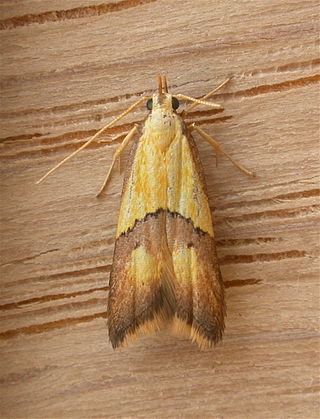Symphyta is a genus of moths in the family Lasiocampidae. The genus was erected by Alfred Jefferis Turner in 1902. All species were described from Australia.

Copromorphidae, the "tropical fruitworm moths", is a family of insects in the lepidopteran order. These moths have broad, rounded forewings, and well-camouflaged scale patterns. Unlike Carposinidae the mouthparts include "labial palps" with the second rather than third segment the longest. With other unusual structural characteristics of the caterpillar and adult, it could represent the sister lineage of all other extant members of this superfamily. The genus Sisyroxena from Madagascar is also notable for its unusual venation and wing scale sockets.

Eupterotidae is a family of insects in the order Lepidoptera with more than 300 described species.

Orgyia is a genus of tussock moths of the family Erebidae. The genus was described by Ochsenheimer in 1810. The species are cosmopolitan, except for the Neotropical realm.

The Bombycidae are a family of moths known as silkworm moths. The best-known species is Bombyx mori (Linnaeus), or domestic silk moth, native to northern China and domesticated for millennia. Another well-known species is Bombyx mandarina, also native to Asia.

The Lecithoceridae, or long-horned moths, are a family of small moths described by Simon Le Marchand in 1947. Although lecithocerids are found throughout the world, the great majority are found in the Indomalayan realm and the southern part of the Palaearctic realm.
The Tineodidae or false plume moths are a family of moths with in some cases unusually modified wings: Like in some related moths, the wings of several Tineodidae are decomposed into several rigid spines. This is a small family, with about a global total of 20 species described to date; some undescribed species are known or suspected to exist however. They seem to be of Australian origin, where they are most diverse, but range through the Wallacea to Southeast and South Asia, and into the Pacific to the Marquesas Islands.

Arotrophora is a genus of tortrix moth. They occur in Australia, where they are strongly associated with the plant family Proteaceae. All of the known Australian larvae bore in Banksia flower spikes. The genus was recently discovered from the Oriental region and one species is found on Papua.

Scoparia is a grass moth genus of subfamily Scopariinae. Some authors have assigned the synonymous taxon Sineudonia to the snout moth family (Pyralidae), where all grass moths were once also included, but this seems to be in error.

Macrobathra is a genus of moths in the family Cosmopterigidae. Most species are endemic to Australia.

Erechthias is a genus of the fungus moth family, Tineidae. Therein, it belongs to the subfamily Erechthiinae, of which it is the type genus. The exact circumscription of this genus is still disputed, but it may encompass more than 150 species.

The Depressariinae – sometimes spelled "Depressiinae" in error – are a subfamily of moths in the superfamily Gelechioidea. Like their relatives therein, their exact relationships are not yet very well resolved. It has been considered part of family Elachistidae sensu lato or included in an expanded Oecophoridae. In modern classifications they are treated as the distinct gelechioid family Depressariidae.
Imbophorus is a genus of moths in the family Pterophoridae. It is endemic to Australia.

Xyloryctidae is a family of moths contained within the superfamily Gelechioidea described by Edward Meyrick in 1890. Most genera are found in the Indo-Australian region. While many of these moths are tiny, some members of the family grow to a wingspan of up to 66 mm, making them giants among the micromoths.

Pedois is a genus of moths of the family Depressariidae.
Teleclita is a genus of moths in the family Notodontidae. The genus was described by Turner in 1903.

Procometis is a genus of moths in the family Autostichidae.

Doratifera is a genus of cup-moth caterpillars in the family Limacodidae. The genus was erected by James Duncan in 1841. There are about 13 described species in Doratifera, found primarily in Australia. They are called cup-moths because of the shape of their cocoons. In the species Doratifera vulnerans, the venon has a complex structure having 151 different protein-based toxins produced from 59 distinct protein families. The venom can be used in pesticides and drugs.

Antipterna is a genus of moths of the family Oecophoridae, first described by Edward Meyrick in 1916.














